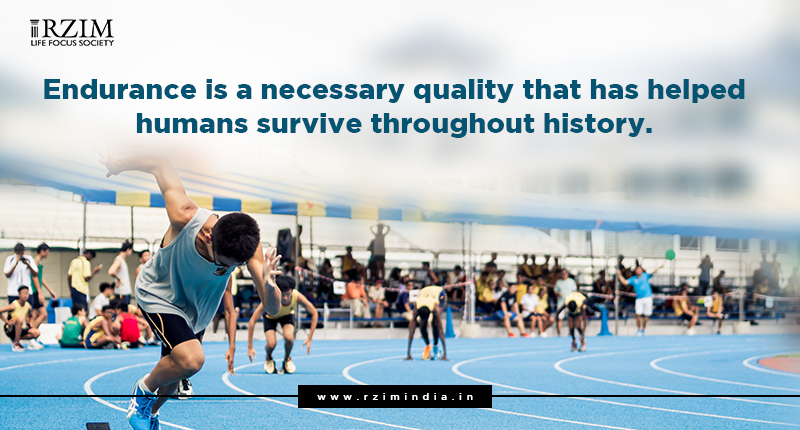Endurance
By Margaret Manning
It is a task performed with repetitive motion, often in the heat of the day for hours and hours. It is carried out despite its monotonous nature, regardless of the blisters that form on delicate skin or the pain that engulfs an aching back, hands, and knees. It is a task done in the hope of preventing encroaching chaos and destruction. It is a time-consuming, never ending, and back-breaking task demanding me to perform it over and over again. It is weeding my garden!
When I first began clearing weeds from my garden, I had a zeal that carried me through all of the physical weariness and the mental monotony of this repetitive task. Often taking up an entire day during the weekend or hours after work, I would weed tirelessly until all I saw was the freshly cleaned soil and beautiful, flourishing plants once choked by weeds. Sadly, it seemed that no sooner had I cleared the garden bed that weeds resurged relentless in their attack. As I focused on one particular section of yard, another section would be ambushed. I am easily overwhelmed by the reality that my labor merely delays the advance of weeds; they come back year after year no matter how far down I dig or how many of their spreading rhizomes I unearth. My stamina to continue to nurture my plants and combat the weeds wanes with each summer season.
Of course, I am ashamed at my flabby determination. How silly this would seem to those whose endurance has been tested in the fires of life-and-death situations, those who have been asked to survive in the most crushing circumstances? I read about endurance-athletes who run, swim, or climb for miles. I wonder about this kind of tenacity as I muster my comparatively small quantum of energy for the more quotidian task of caring for my garden. And I wonder about the quality of a person who undertakes endurance sports or who has survived and thrived despite incredible, life-threatening odds.
If I am honest, I worry that my feeble perseverance in the garden is consistent with a wider decline in tenacity. Endurance is a quality that appears to be in short supply, even as more and more social science researchers are exploring the qualities of resilient individuals. With a culture geared towards increasing ease and comfort, perhaps this is not surprising. There are fewer opportunities to stretch and challenge endurance muscles when I can simply press a button, take a pill, or send an instant message. We don’t have to be endurance athletes to realize that we have less and less ability to persevere in all of the repetitive, exacting, and tedious details of our daily lives.

Ferdinand Hodler, The life of Weary, oil on canvas, 1892.
Nevertheless, endurance is a necessary quality that has helped humans survive throughout history. As such, it is a universally lauded characteristic extolled in the great literary classics like Homer’s Odyssey or in the ancient texts of the Bible. It is a quality deemed necessary for both physical and spiritual survival. The apostle Paul in his first letter to the Corinthians compared the spiritual life to a race requiring the endurance of a long-distance athlete.(1) The apostle James suggests that endurance results when faith is tested by trials of various kinds. He notes that endurance produces maturity and contentment.(2) With such wonderful results, who wouldn’t want more endurance?
Yet, there are times when these admonitions seem out of reach for all who endure crushing circumstances that fatigue and debilitate. Just like the weariness that overtakes me when I realize that I will not ever overcome the weeds in my garden, how many others have a far greater, far more burdensome exhaustion that saps their life energy when the prevailing appears impossible?
For all who experience the elusiveness of endurance or who wonder if having endurance even matters in the end, the words of the ancient Hebrew prophet Isaiah might offer hope: “The Everlasting God, the Lord, the Creator of the end of the earth does not become weary or tired… God gives strength to the weary, and to the one who lacks might God increases power. Though youths grow weary and tired, and vigorous young men stumble badly, those who wait on the Lord will renew their strength; they will mount up with wings like eagles. They will run and not get tired, they will walk and not become weary.”(3) Speaking to a people in exile, weary of ever going home, the prophet reminds them that their God does not tire. Not only does their God “not faint,” this God will give power to those who wait on Him. The prophet employs a unique feature common in Hebrew poetry for emphasis of a very important point. Triplets or three-lined sequences are used to emphasize the last line of the sequence: They will mount up with wings like eagles. They will run and not get tired. They will walk and not become weary. As writer Melissa Bane Sevier notes, the last line in this sequence is more important to the author than the middle or the beginning of the sequence.(4) Yet, this order is not what most would expect. Sevier continues:
“If he were thinking/writing/preaching the way I would, the poet would have said, ‘They shall walk and not faint, they shall run and not be weary, they shall mount up with wings like eagles. Surely, I would say, flying like an eagle should be the pinnacle moment of this poem, not walking without falling down.’”(5)
But this is the crucial message for all who are weary in their endurance. Sometimes, we cannot soar like an eagle, no matter how hard we try. Sometimes, all we can do is to walk. Walking without fainting might be our endurance aspiration. The prophet assures even these weary ones that the enduring God walks with them and is their strength for them. God does not upbraid those who can only walk, but encourages them as they walk to rest in God, to wait upon God—for God will be their strength. Indeed, Isaiah speaks of the Deliverer of Israel as one who cares for those who struggle to endure: a bruised reed he will not break and a dimly burning wick he will not extinguish.
Margaret Manning Shull is a member of the speaking and writing team at Ravi Zacharias International Ministries in Atlanta, Georgia.
(1) 1 Corinthians 9:24-25a
(2) James 1:2-4
(3) Isaiah 40:28-31
(4) Melissa Bane Sevier, “To Be Able to Walk,” Contemplative Viewfinder, Feb. 3, 2015.
(5) Ibid.
Originally posted on ‘A Slice of Infinity’ on August 8, 2017
You can follow Margaret Manning on twitter @MargMannShull and Slice of Infinity @SliceofInfinity


There are no comments